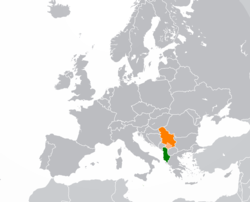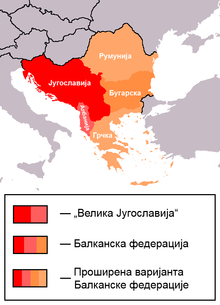Albania–Serbia relations
 | |
Albania |
Serbia |
|---|---|
Albanian–Serbian relations are foreign relations between Albania and Serbia. Albania has an embassy in Belgrade.[1] Serbia has an embassy in Tirana.[2] Both countries are full members of the Council of Europe, the Organization for Security and Co-operation in Europe (OSCE), the Central European Free Trade Agreement (CEFTA) and the Organization of the Black Sea Economic Cooperation (BSEC). Also both countries are recognized as potential candidate countries by the European Union.
History
Ottoman period
In the Ottoman period, Serbian diplomat Ilija Garašanin contacted the abbot of Mirdita, Msgr. Gasper Krasniqi, with the goal of acquiring the Albanian Catholic element as the alleged solution to the "Eastern Question".[3] However, their goals were different. While Garašanin considered those contacts as means for the realization of a Serbian exit to the Adriatic Sea, Krasniqi made effort to help Serbia to organize a revolution of the Albanian Catholic community, primarily Mirdita, against the Turks, for the political freedom and independence of Albania.[3]
Balkan wars
At the beginning of Balkan Wars, one of the important strategic goals of Serbian politics was to acquire a corridor to the Adriatic Sea through northern Albania.[4][5] The First Balkan War found the Albanians as a nation fighting for its own national state. At the end of 1912, after the Porte recognized the autonomy of Albania, neighboring Balkan states Serbia, Montenegro and Greece jointly attacked the Ottoman Empire and during the next few months partitioned all Ottoman territory inhabited by Albanians.[6] The Kingdom of Serbia occupied most of the Albanian-inhabited land and the Albanian Adriatic coast. These events greatly contributed to the growth of the Serbian-Albanian conflict.[7]
World War II

During World War II, a very close cooperation developed between the People's Liberation Army of Yugoslavia and the People's Liberation Army of Albania. The Albanian People's Army assumed power in the country in 1944. Democratic Federal Yugoslavia was the first country to recognize the new government of Albania in April 1945.[8]
There were communist plans to create a Balkan federation which would include Yugoslavia, Albania, Romania, Bulgaria and Greece.[8] However, after the resolution of Informbiro 1948, Albania broke relations with the Yugoslav communists, because Enver Hoxha remained loyal to Stalin.[8]
Yugoslav wars
In June 1991, as the Yugoslav wars broke out, Albanian Foreign Minister Mehmet Kapllani visited Croatia. During this time, Ramiz Alia, President of Albania, began discussions with ethnic Albanian leaders in Kosovo. In July 1991 relations between Albania and Yugoslavia were strained. Yugoslav and Albanian leaders exchanged fire, and Serbian leaders accused Albanians of instigating unrest in Kosovo and not respecting frontier markers. The Yugoslav government released a statement accusing Albania of interfering in Yugoslavia’s internal affairs and warned Albania that Yugoslavia would react "decisively with all available means" to any challenges to its sovereignty.[9]
In a reversal of previous policies at the time, Albania improved relations with the Soviet Union and the United States to stop possible Serbian aggression and to stop the superpowers from exploiting unrest in Albania.[9]
As refugees were fleeing across the border into northern Albania in 1998, Albania had proved that Yugoslavia had executed a campaign of ethnic cleansing, and called on the international community to intercede.[10]
In March 2009, Vladimir Vukčević, Serbia’s war crimes prosecutor, asked Albania to reinvestigate claims that some of the Serbs who disappeared during the Kosovo conflict may have been killed for their organs in Albania.[11]
Minority rights
In December 2008 Serbian police arrested ten former members of the Kosovo Liberation Army (KLA), in an Albanian-populated area bordering Kosovo. Serbia's war crimes prosecution office stated that it had evidence that the ten KLA members had killed 51 people and kidnapped 159 civilians in Kosovo between June and October 1999. In January 2009 Albanian President Bamir Topi demanded that Serbia respect the Albanian minority in southern Serbia.[12]
See also
- Foreign relations of Albania
- Foreign relations of Serbia
- Accession of Albania to the European Union
- Accession of Serbia to the European Union
- Serbian–Albanian conflict
References
- ^ "Vandals damage Albanian embassy in Belgrade". BBC. March 29, 1999.
- ^ "Serbian charge d'affaires prepares to quit Albania". BBC. February 20, 2008.
- ^ a b Prof. dr. Zef Mirdita, ALBANIA IN THE LIGHT OF SERBIAN FOREIGN POLICY
- ^ Dimitrije Bogdanović: Knjiga o Kosovu
- ^ Aleksandar Bošković, Albanci kao metafora
- ^ Report of the International Commission to Inquire into the Causes and Conduct of the Balkan War (1914)
- ^ Serbien und Albanien: ein kritischer Beitrag zur Unterdrückungspolitik der serbischen Bourgeoisie
- ^ a b c Milorad Komatina, Enver Hodža i jugoslovensko-albanski odnosi, Službeni list SRJ, Beograd 1995. godina
- ^ a b Keohane, Robert Owen. After the Cold War. pp. 369, 370.
{{cite book}}: Unknown parameter|coauthors=ignored (|author=suggested) (help) - ^ "World: Europe Albania accuses Serbia of ethnic cleansing". BBC. June 2, 1998. Retrieved 2009-04-16.
- ^ "Serbia asks Albania to probe organ trafficking". Associated Press. March 2, 2009. Retrieved 2009-04-16.
- ^ "Albania urges Serbia to respect minority rights". 8 January 2009. Retrieved 2009-04-16.
External links
- "Embassy of Serbia in Tirana". Retrieved 2009-04-16.
- "ALBANIA'S COMPLAINTS.; Continued Advance of Serbian Troops Is Charged". The New York Times. September 18, 1920. Retrieved 2009-04-16.
- "Serbian legation in us makes public charges that Albanians plan to attack Serbia along the frontier". The New York Times index. 1920. p. 10. Retrieved 2009-04-16.
- "Chekrezi denies Albania is aggressive says Serbs plan attack on Serbian-Macedonian front". The New York Times index. 1920. p. 10. Retrieved 2009-04-16.
- "SY Groutich holds that outside influences are responsible for clashes". The New York Times index. 1920. p. 10. Retrieved 2009-04-16.
- "Allies and US appealed to by Albanian Foreign Minister to compel withdraw of Serb troops". The New York Times index. 1920. p. 10. Retrieved 2009-04-16.
- "Albanian Comr to US C.A. Chekrezi, replies to Groutich, Groutich answers Chekrezi, Chekrezi replies to Groutich, charges continued advance of Serbs". The New York Times index. 1920. p. 10. Retrieved 2009-04-16.
- "Theatre groups help build ties between Albania, Serbia". SETimes.com. 2006-05-02. Retrieved 2009-04-16.
- "Albanian, Serbia-Montenegro presidents discuss bilateral relations, Kosovo". Asia Africa Intelligence Wire/Financial Times Ltd./BBC. 10-APR-03. Retrieved 2009-04-16.
{{cite news}}: Check date values in:|date=(help) - Prof. dr. Zef Mirdita, ALBANIA IN THE LIGHT OF SERBIAN FOREIGN POLICY

